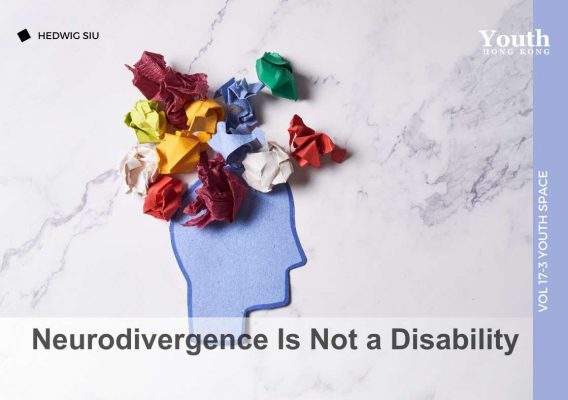by Hedwig Siu
Discover how the writer challenges society’s narrow definition of “normal” and shows why neurodivergence should be seen as a strength.
The human mind is something we will never be able to figure out truly. Everyone’s mind works differently, and some people perceive things in completely different ways from others. When there are a million ways to interpret one thing, who gets to decide what’s “normal” and what’s not?
I’ve grown up surrounded by people with ADHD (Attention Deficit Hyperactivity Disorder): my mother, my brother, teachers, and close friends. Some of them also live with dyslexia. Though I haven’t been formally diagnosed, I show mild symptoms myself. My fascination with psychology stems from this environment—I’ve always wanted to understand how the mind works.
To me, humans are judging things that seem out of the ordinary, just like bullying, racism and discrimination, even though we are equally different from one another. While my opinion may seem hypocritical in this current light, it is indeed how many in this modern society are treated. It makes me question: What do we really mean when we talk about “abnormality”—and who decided that divergence from the norm is a flaw?
First, what is neurodivergence? Neurodivergence describes the mind of such an individual who thinks or perceives differently from most. This could be someone with autism, ADHD, BPD and much more. However, neurodivergence has been cast in a negative light for quite some time, with people mingling it with mental disabilities. Although this is what people claim it to be, a more accurate clarification between the two would be that neurodivergent individuals can learn, understand and communicate just as anyone else does. The only slight difference in their mind from your average individual would be the way they see something.
Autistic people might notice things or details that others might not, or ADHD people might think faster than someone else without. These are measly examples of reasons neurodivergent people are considered abnormal, but in truth, they are no more than small bits of behaviour that make them slightly different from others. However, true mental disabilities are conditions that are unchangeable and affect one’s mind so heavily that they cannot live a normal life, permanently damaging or hurting their mind, such as schizophrenia, brain cancer and tumours. These types of patients will never truly recover and will be permanently disabled.
Meanwhile, neurodivergent individuals have an albeit slim chance of “recovery” and are not usually medicated. Despite the accusations, neurodivergent individuals are not crazy, slow or stupid, and many of them, on the contrary, have high potential and intelligence.
Now the question is raised. What is ADHD if it is not a disability? In reality, ADHD is merely a type of behaviour which causes one to be inattentive or easily distracted. Its “symptoms” include inattentiveness, constant fidgeting, lack of patience, carelessness and poor memory, among others, giving the “disorder” its name.
However, nothing is truly bad with no upsides. With the ability to think faster than others, ADHD-diagnosed individuals tend to be highly creative and innovative, and if intuitive enough, have a very developed ability to multitask and usually complete their tasks extremely efficiently, albeit with some minor mistakes.
According to diagnosed patients with their ages ranging from seven years old to 40+, they believe that although they may perceive and understand things more slowly, they are persevering and find their condition part of themselves and offer them a new perspective than others.
Why should we restrict what people do merely based on our assumptions? Why should we judge individuals who don’t seem to meet the standards of society when we are all unique and not carbon copies of each other? Just as people of different races or genders once faced discrimination, the neurodivergent community are also suffering a similar fate, because this topic has not been addressed or brought up enough.
However, if we assume that someone is incapable of something, they will likely try to truly know whether they are capable of doing it. But hey, if our assumptions influence people, why don’t we instead assume a neurodivergent individual can be capable of great feats? Why should we stigmatise and judge someone before we truly understand their abilities? Would it not be hypocritical if we chastise a racist, but after a moment, slander the neurodivergent community? Of course, if you believe that you or someone around you is neurodivergent, please don’t hesitate to reach out and seek help, because there is a warm and welcoming community ready to accept all our differences and unique abilities. ■
Hedwig Siu is a 13-year-old international school student who enjoys reading, sleeping, writing, public speaking, drawing and fluffy things. She likes fiction and her favourite book is The Midnight Library. She aspires to become a psychologist and end discrimination towards neurodivergence one day.



